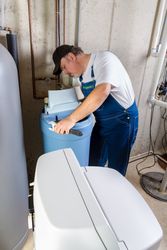
Many people don’t understand the difference between hard and soft water. However, it can affect your health and household management. This knowledge can also help you make an informed decision if you need a water softener installation service.
What Are the Disadvantages of Hard Water?
The primary difference between soft and hard water is the dissolved minerals they contain. Hard water typically contains higher levels of magnesium and calcium, while soft water has lower amounts of these minerals.
Magnesium and calcium are essential to our health, which makes hard water suitable for drinking. However, using hard water for cleaning has its drawbacks. It can interfere with most cleaners, causing you to use more soap or detergent to get the job done. It can also leave a residue buildup on your appliances, kitchenware, and pipes.
Using hard water for bathing can also make your hair brittle and your skin dry. These disadvantages prompt many homeowners to schedule a water softener installation.
How Do Water Softening Systems Work?
 This system processes hard water and makes it softer via ion exchange. This happens when hard water flows through a holding tank filled with resin beads. Each bead attracts positively charged magnesium and calcium ions and releases sodium or potassium ions into the water flowing out. Resin beads, which come in different types, may last anywhere from three to ten years before they need to be replaced.
This system processes hard water and makes it softer via ion exchange. This happens when hard water flows through a holding tank filled with resin beads. Each bead attracts positively charged magnesium and calcium ions and releases sodium or potassium ions into the water flowing out. Resin beads, which come in different types, may last anywhere from three to ten years before they need to be replaced.
If you’re looking for reliable water softener installation, turn to Fast Flow Plumbing & Drain in New Braunfels, TX. This locally owned and operated company offers 24/7 emergency plumbing services and uses the latest technology in the field for plumbing repairs, water heater repair, drain inspections, sewer cleaning, and other services. Call (830) 312-8822 to schedule an appointment or visit their website to learn more about their work.
About the Business
Have a question? Ask the experts!
Send your question

